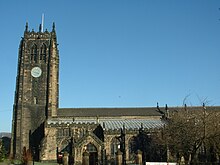

William Rokeby
Quick Facts

Biography
William Rokeby (died 1521) was a leading statesman and cleric in early sixteenth-century Ireland, who held the offices of Bishop of Meath, Archbishop of Dublin and Lord Chancellor of Ireland. He is commemorated in the Rokeby Chapels in two Yorkshire churches, St Oswald's Church, Kirk Sandall, and Halifax Minster.
Early life
He was born at Kirk Sandall, near Doncaster in South Yorkshire, eldest of the five sons of John Rokeby (died 1506 ). His younger brother Richard was Comptroller of the Household to Cardinal Wolsey and later Treasurer of Ireland. William retained a deep affection for Kirk Sandall and returned there to die. He went to school at Rotherham; studied at Oxford and became a fellow of King's Hall, later Trinity College, Cambridge. He became vicar of his home parish in 1487, and was transferred to Halifax, another town for which he had a deep attachment, c. 1499. In 1507 he was made Bishop of Meath.
Later career
On the death of Walter Fitzsimon in 1511, Rokeby became Archbishop of Dublin. He was Lord Chancellor of Ireland from 1512 to 1513 and from 1516 to 1522.
O'Flanagan believes that he was a good and diligent Lord Chancellor, although he did not produce many recorded judgments. He was clearly a trusted servant of the Crown: in particular the Lord Deputy, Surrey, with the approval of Henry VIII, chose Rokeby in 1520 as mediator in the feud, which had become almost uncontrollable, between Maurice FitzGerald, 9th Earl of Desmond and Piers Butler, 8th Earl of Ormond.
As Archbishop he also made a reputation as a peacemaker, settling a long and bitter dispute between the Dean and Chapter of St. Patrick's Cathedral. He gave permission to Gerald FitzGerald, 9th Earl of Kildare for the original foundation of Maynooth College (which was suppressed in 1535). He was frequently at the English Court, (to the extent that he was accused of neglecting his official duties) and participated in the christening of the future Queen Mary I and the ceremony by which Wolsey received his cardinal's hat.
As Archbishop of Dublin he is best remembered for the Synod of 1518. The Synod prohibited the use of any tin chalice at Mass, and the disposal of Church property by laymen; and attempted to regulate the procedure for dealing with intestate estates, the payment of tithes and burial fees and the rules for admission to the clergy. Rather comically, Rokeby strictly forbade clergymen to play football.
By 1521 his health was failing: he retired to Kirk Sandall and died there on 29 November.
The Rokeby Chapels
Rokeby made elaborate provision in his will for the disposal of his remains: he asked that his body should be buried in Halifax, but that his heart should be buried in St Oswald's Church, Kirk Sandall, and that mortuary chapels be erected at both spots. The Rokeby chapels in St Oswald's and Halifax Minster still exist.

Character
O'Flanagan praises Rokeby as a good man, a good bishop and, so far as we can tell from the scanty records, a good judge. Elrington Ball, while acknowledging his good qualities, suggests that he was an unsuitable appointment as Irish Lord Chancellor, due to his frequent absences in England.